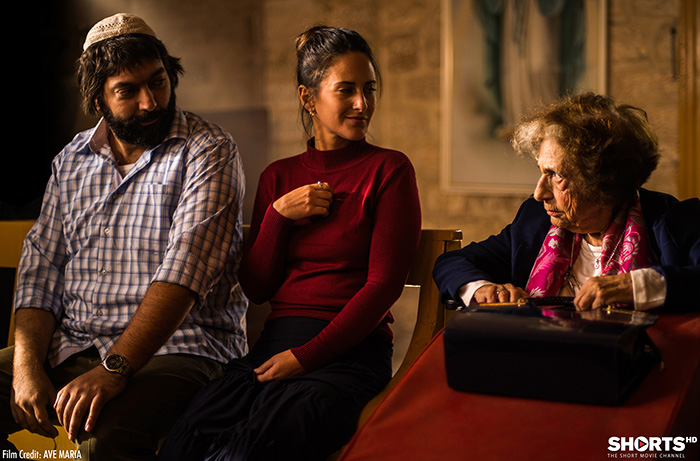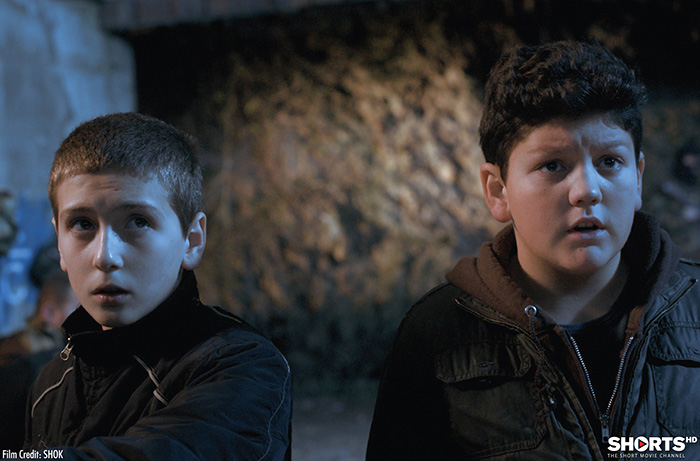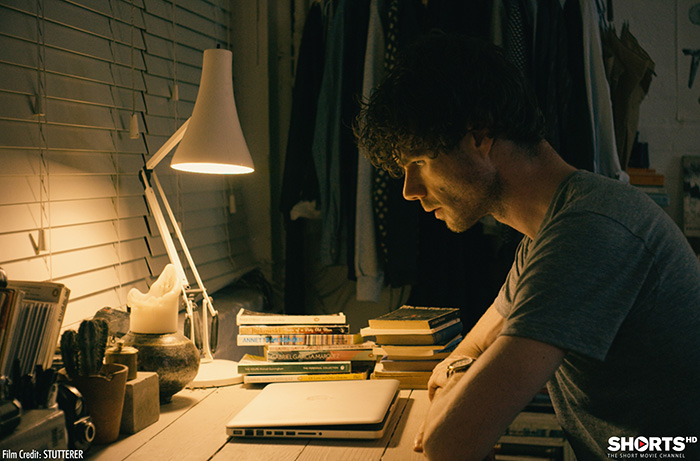Ahead of the Academy Awards, we’re reviewing each short category. See the Live Action section below and the other shorts sections here.

Ave Maria – Palestine/France/Germany – 15 minutes
Director Basil Khalil and co-writer Daniel Yáñez have come up with a cutely comic conceit for their short film Ave Maria. It’s the West Bank—miles from civilization—and a car carrying a Jewish man, his wife, and his mother crashes into a Catholic church run by five Arab nuns who have taken a vow of silence. If everyone follows the rites of their religion, the women able to help the family mustn’t talk and the family, who realize that it’s now the Shabbat, can’t operate any machinery necessary to move along. It’s quite the conundrum for the devout and a perfect recipe for discovering a common ground as human beings with enough laughs to keep us entertained for the duration.
The comedy is mostly visual such as four nuns in dark habits ignoring the constantly ringing doorbell so that only young Sr. Marie (Maria Zreik) in her white has the impatience to see what’s happening outside. Then there is the decapitated Virgin Mary statue, the bickering old Jewish mother (Ruth Farhi‘s Esther) blaming her daughter-in-law (Maya Koren‘s Rachel) for the commotion, and the torn foibles of Moshe (Shady Srour) desperately trying to honor his religious obligation despite knowing the only way out of his predicament is to ignore it. There probably hasn’t been this much noise at the church since its construction, but you can hardly blame everyone’s mounting frustration.
It doesn’t get any better than watching a young nun’s sass when Moshe asks Marie to dial and hold the phone to his ear so he won’t “technically be using it” while he’s checking his wristwatch. I don’t know the particulars of Jewish Sabbath and what “machinery” is off limits, but the hypocrisy is fantastic. More than that is how looks can deceive so easily inside a world built upon historical grievance and bigoted preconception. Whether it head nun Sr. Marie Angeline (Huda Al Imam) knowing how to disassemble a gun or Sr. Marie tinkering under an automobile’s hood, kindness goes a long way to finding solutions. You do what you must in the moment because there’s always time for a few Hail Marys afterwards.
B

Day One – USA – 25 minutes
It’s just too much: too manipulative, too familiar, and too convenient. The trouble with Henry Hughes‘ Day One all stems from one line when his American military unit’s new interpreter Feda (Layla Alizada) meets her predecessor Naz (Shari Vasseghi). They speak about being away from home and family in the context of their being wives—a legitimate concern with the Muslim religion holding a woman akin to property with which to serve her husband, but overly “feminine” as only a male writer could write (despite the story being co-created by a woman in Dawn DeVoe). Both divorced, the subject of children “naturally” arrives like we know it must and Feda admits she has none. More than that, she explains how she didn’t want any.
That was it. As soon as she said this line I knew where exactly where the film was going to go: the same place so many films these days do where the “career woman” who has no time for children finds her heart softened and biological clock ticking by the end. It’s such an archaic sentiment trying for emotional resonance despite only achieving a backhanded machismo that ultimately puts the female lead in her place as maternal above all else, her “natural” state. When the going gets tough she will hold out her arms, hold whatever child is being delivered her way, and all will finally be right with the world. I desperately hoped there would be more, but I knew the prospects were very thin.
The possibility did exist, though. The beginning depicts Feda’s commanding officer Lt. Adams (Bill Zasadil) walking in on her in the shower just as it appears her period starts. I think this is what’s happening as blood runs down her leg, but that’s not what freaks him out. It’s instead just the sound of a woman’s voice. But even though Hughes apparently ignores what he introduced, its presence made me believe this would be about a woman in the military showing these men that she’s their equal. Something like her period occurs and she’s unfazed—strength in the face of adversity. Instead it’s merely the first point of unrealized potential, a forgotten detail included for no reason but to hit us over the head that she’s female.
We literally learn nothing else. Who’s Dr. Nasir (Navid Negahban) and why does Adams need an interpreter on their latest trip when he appears to speak Arabic and English? Why does Nasir sometimes speak tell Feda in English what to tell someone inches away in Arabic when he could himself? It made me think that she didn’t need to be there except that the story contains a pregnant woman falling to induce the irregular birth of a sideways baby while Muslim customs prevent Nasir from entering the room to help. There are so many contrivances that it’s hard to take anything at face value. Every action and every revelation ultimately becomes rendered fictitious MacGuffins to put Feda’s maternal instincts front and center. No more, no less.
C-

Alles Wird Gut [Everything Will be Okay] – Germany/Austria – 30 minutes
It’s interesting how the phrase “everything will be okay” carries such a stigma of pandering deflection now. The words are for all intents and purposes meaningless in their true context, transformed instead to connote a sense of insecurity through hopeful platitudes without any sense of whether or not the situation will resolve itself in an “okay” manner at all. We try to soothe by saying it, but I’d argue we actually instill more trepidation. So when I saw the title of Patrick Vollrath‘s film, Alles wird gut [Everything Will Be Okay], I couldn’t help seeing it as an ominous calling card for something to become anything but. As such, young Lea’s (Julia Pointner) fun day with Dad (Simon Schwarz‘s Michael Baumgartner) quickly turns horribly wrong.
You don’t have to be a rocket scientist to know the situation between Michael and his ex-wife (Marion Rottenhofer) is strained considering his arrival is met with impatient frustration before he even presses the button to open her gate to no avail. When he sees Lea he holds his arms out and suddenly she’s in the car without him giving a second glance to the woman who’s ostensibly taken his daughter away. It was probably his fault as to why custody is so unequal now, but you still can’t help feeling for him. Even when he does the whole absentee Dad shtick by taking her to the mall to pick out any toy she wants, we empathize with his attempts to connect and prove his love.
But the tone shifts and we start seeing the motives behind his generosity. Actions become bribes; fun activities tainted by unusual requests like a shift from goofy photo booth photos together to a more serious “neutral” portrait of Lea alone. To get to the fair they must sign something first and despite having the whole night together, one more go on the bumper cars will make them late. We know instantly what’s to happen as soon as the photo booth electronically utters its new command and to a point so does Lea. She recognizes something’s off, but youth prevents her from putting two and two together until reality finally breaks through the façade Michael has constructed. Eventually this little girl discovers she knows only too well.
What’s great about Vollrath’s look at a father’s desperation is his refusal to make him evil. We know Michael isn’t a bad guy—he’d never hurt his daughter or ex-wife. In his mind he’s been wronged, defeated by the system, and no other course of action to get back what he deserves exists. It’s a shattering performance of twitches; smiles fading to worry as friendly exchanges turn into dictatorial rules. Better yet is little Pointner whose innocence gradually fades to uncover skepticism and a keen appreciation for the unfortunate situation they’re in. Lea loves her dad and wishes him back at home with mom, but it isn’t up to her. Sadly divorce often proves as hard on the adults as the child. In this case more.
B+

Shok [Friend] – Kosovo/UK – 21 minutes
There’s no more poignant way to tell a tale of war than through the eyes of children. This is what writer/director Jamie Donoughue does with Shok, a short film set during the Kosovo War between the Federal Republic of Yugoslavia (spearheaded by the Serbians) and the Kosovo Liberation Army at the end of the twentieth century. Rather than show battlefield gunfire and nameless bodies falling before new soldiers can take their place, he enters a tiny village to meet best friends Oki (Andi Bajgora) and Petrit (Lum Veseli) wandering the streets on the former’s new bicycle in order to make some extra money so the latter can purchase his own. They are Albanians, meant to keep their heads down, walking straight into the enemy’s arms.
I got ahead of myself, though. The film actually starts with an adult Petrit (Kushtrim Sheremeti) shaken by an old bike in the middle of the road. It stirs something that he may not have felt for years—some feeling or tragic incident from his past he cannot simply ignore any longer. This is our entry into his flashback of smiling boys making the best of a horrible situation. So joyous and playful, the particulars of their world are disguised until after they’ve left a surly group of Serbian military far from home. As an American with little knowledge of the conflict, those men in camouflage could be anyone. Only when Petrit’s father warns of curfew and Oki shows fear do we understand the danger of their situation.
Their nationality is quickly becoming disposable in their own birthplace by Serbian law enforcement. They’re supposed to learn in Serbian and adopt their ways despite home remaining Kosovo. The men Petrit befriends to earn a few bucks are an enemy so vile to his people’s existence that his actions prove traitorous. And for what? To make his face recognizable? To put his life in danger for the promise of pocket change yet the reality of potential slaughter? He’s a boy, though, and it’s easy to forget that the allure of danger and the desire to be a man can lead boys astray through false confidence and worth. But it isn’t long before Petrit is shown the truth. Unsurprisingly it’s Oki who supplies it.
What follows is a depiction of the horror Kosovo endured on an emotional, micro-scale—the short is based on true events. If Petrit and Oki wanted to be men, this is their opportunity with the highest stakes possible. It’s the chance to show humility and empathy, to go into the line of fire for those they love because the persecution they face is unjust. But it’s also an opportunity for the opposition to show how ruthless their war is. Donoughue pulls no punches providing the boys a chance at redemption while their remorseless enemy sits on the sidelines awaiting a moment to set an example. Shok delivers it with a deafening blow: heroism and martyrdom wrapped within the senseless violence mankind seems destined to continue repeating.
B+

Stutterer – UK/Ireland – 12 minutes
We all have something about us to be embarrassed about. Some have more than one. While most see it as a major distraction no one could ever endure, however, this is rarely the case. Or at least with those you’d want to be around anyway. Few things in this arena are worse than stuttering—some might even say deafness and blindness are easier to cope with because they are definitive. You cannot speak or you cannot see; there’s no sense of deficiency. To stutter is the opposite because it carries a stigma of being able to do something but not as well. In your mind you feel you’re a burden, your audience’s frustration seemingly your fault. So why not just stay quiet?
This is the burden of writer/director Benjamin Cleary‘s Stutterer. His name is Greenwood (Matthew Needham) and he loves words. He’s a typographer—in other words a letterpress printer—who enjoys a game of Go with his father (Eric Richard) and keeps to himself otherwise, smoking cigarettes and eloquently guessing life stories of those around him for personal enjoyment within his own head. He’s intelligent and witty and desperate to help his fellow man if only he possessed the speed at which to do so before making things worse. His existence consists of work, imagination, and family. It’s solitary with one bright spot: Facebook Messenger friend Ellie (Chloe Pirrie). Life is manageable if not comfortable and then she announces a London visit with the prospect of meeting in-person.
It’s Greenwood’s worst nightmare. But why? We assume it’s his stutter and the long-cultivated insecurity against letting people witness his affliction. This is why he feigns deafness with strangers asking him directions. This is why he begins relationships online behind the wall of textual interaction. To think that way, however, is to assume Greenwood’s entire identity revolves around his handicap. Does Cleary give us reason to believe it doesn’t? No. But that’s intentional in order to set us up to fall prey to such close-minded simplicity like he knows we will. It’s deflection by omission and it’s perfectly orchestrated for his climactic revelation—one proving infinitely more about him than her if you peer underneath the surface.
Stuttering is a burden. Do you own it and become stronger as a result or let it own you only to find yourself too scared to unleash it upon the world? Does stuttering make you an introvert or are the two attributes unrelated? Do you avoid the world because you haven’t the time to watch it ostracize you or because it already has? Cleary provides his character a fully realized history in but twelve minutes of real estate by letting these questions sit hidden behind audience assumptions. And Needham dives deep to silently ask them so that we only realize once the answer is known. Many movies fail because they’re defined by their ending. Others excel because their ending reveals how deceivingly complex the rest truly was.
A-
The Oscar Nominated Shorts are in limited theatrical release starting January 29th. See the official site for more details and our reviews of the other shorts sections here.

